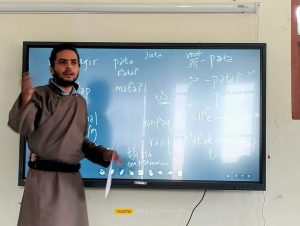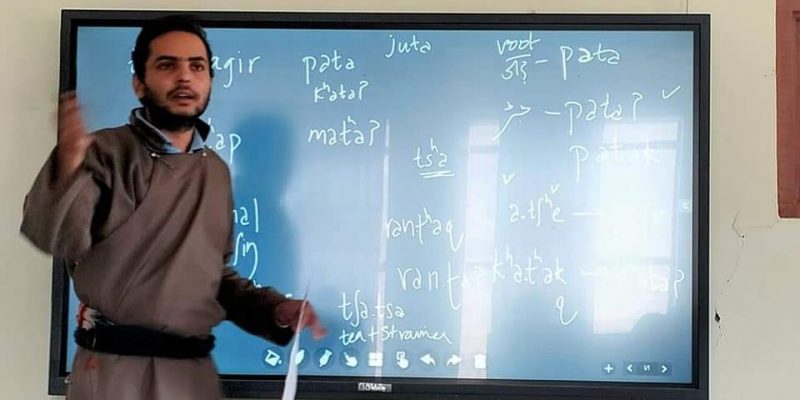5-day training workshop on documentation of Zanskari language held at GMDC Zanskar
KARGIL, AUGUST 12, 2022:
Govt. Model Degree College (GMDC) Zanskar organized a 5-day training workshop on documentation of Zanskari language (from August 4- 8) with infrastructural support from the college and financial support from Endangered Language Fund (ELF).
The workshop was aimed to train Zanskari community members, targeting particularly the under-graduate students of GMDC to document their under-researched and lesser-known language as part of local capacity building.

Maaz Ahmad Shaikh, a graduate research scholar in Linguistics at the University of Alberta, Edmonton, Canada, undertook the entire training in the workshop for all five days.
On the first day, the students were trained to use recording equipment, particularly audio and video recording with a professional recorder.
They were taught how to introduce themselves to the speaker, obtain oral consent from them, take their details before the recording and fill consent form once a recording is completed.
This was followed by hands-on experience recording the speaker Tsewang Gailsten, Assistant Professor of Political Science, GMDC, narrating a short poetry in his Brokskat language along with taking his consent on the same.
Maaz Shaikh briefed the students about the methodology required for metadata preparation and archiving of the recordings and other collected materials.
He also showed his previously deposited language collections of Azamgarhi and Bhojpuri languages at the Computational Resources of South Asian Languages (CoRSAL) archive of the University of North Texas (UNT) Digital Library.
The second day of the workshop started with a lecture explaining topics in Phonetics and Phonology. Shaikh explained the consonants in the International Phonetic Alphabet chart in detail and also described the consonant inventory of Zanskari.
On the third day, vowels in the IPA chart were studied. It was followed by a discussion on the oral and nasalized vowels found in the Zanskari language.
The speaker also taught students the concept of a syllable, its structure, and its importance in analyzing the sound system of Tibetic languages, including Zanskari.
A comparative analysis of the sound patterns of the Western Tibetic languages, particularly Zanskari, Balti, Purik, and Leh Ladakhi was also presented while simultaneously reflecting on the Classical Tibetan spellings.
The fourth day was dedicated to a field trip to the nearby Sani village where students got a hands-on experience on whatever they learned in language documentation.
The project team, led by the researcher and a few faculty members of GMDC, along with Prof. Tadeusz Slupski from Warsaw, Poland, visited the house of Stanzin Choszin, a B.Sc. student at GMDC from Sani village, for data collection, where the speech of her parents was recorded following the best practices in documentary linguistics.
They were divided into three groups, out of which one of the groups led by the researcher went to document Kesar Saga in the field of Tashi Zangmo, where she was harvesting her crops.
Abi Zangmo was one of the very rare Zanskari people left who could narrate the complete saga of King Kesar of Ling. She told the group that the whole narration could take up to three days. She then narrated only the first part for time being.
On the fifth day, the students were taught consonants and vowels of Zangskari, which was beneficial for good transcriptions of the recordings.
Later on, basic morphology was taught to the students, along with a brief discussion on morpho-phonemic analysis. A small group of about seven students was trained to use SayMore for metadata management and transcription and translation.
On the concluding day, the students were awarded with certificates of participation.
The program was held in view of continued documentary work by the students and any responsible member of the Zangskari linguistic community on their language.
Subsequently, a Memorandum of Understanding (MoU) was signed by Maaz Shaikh, Dr. Jamphel Sheyan, and Nasir Shabani on the custody of the equipment and devices.
Shaikh also donated a number of books on linguistics and Tibetic languages to the College Library. Dr. Sheyan and the principal presented vote of thanks to the speaker for his efforts and dedication in successfully conducting the training workshop.

Comments